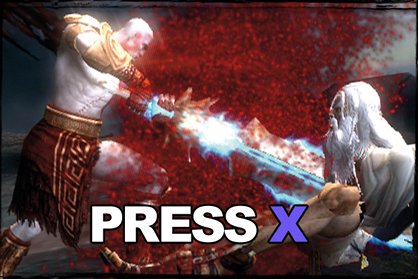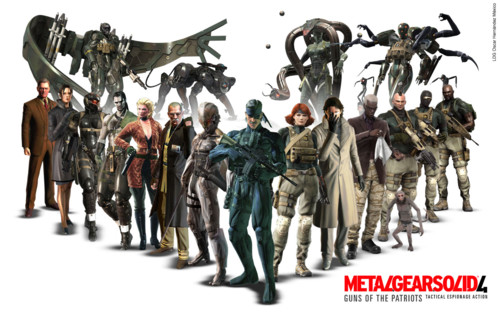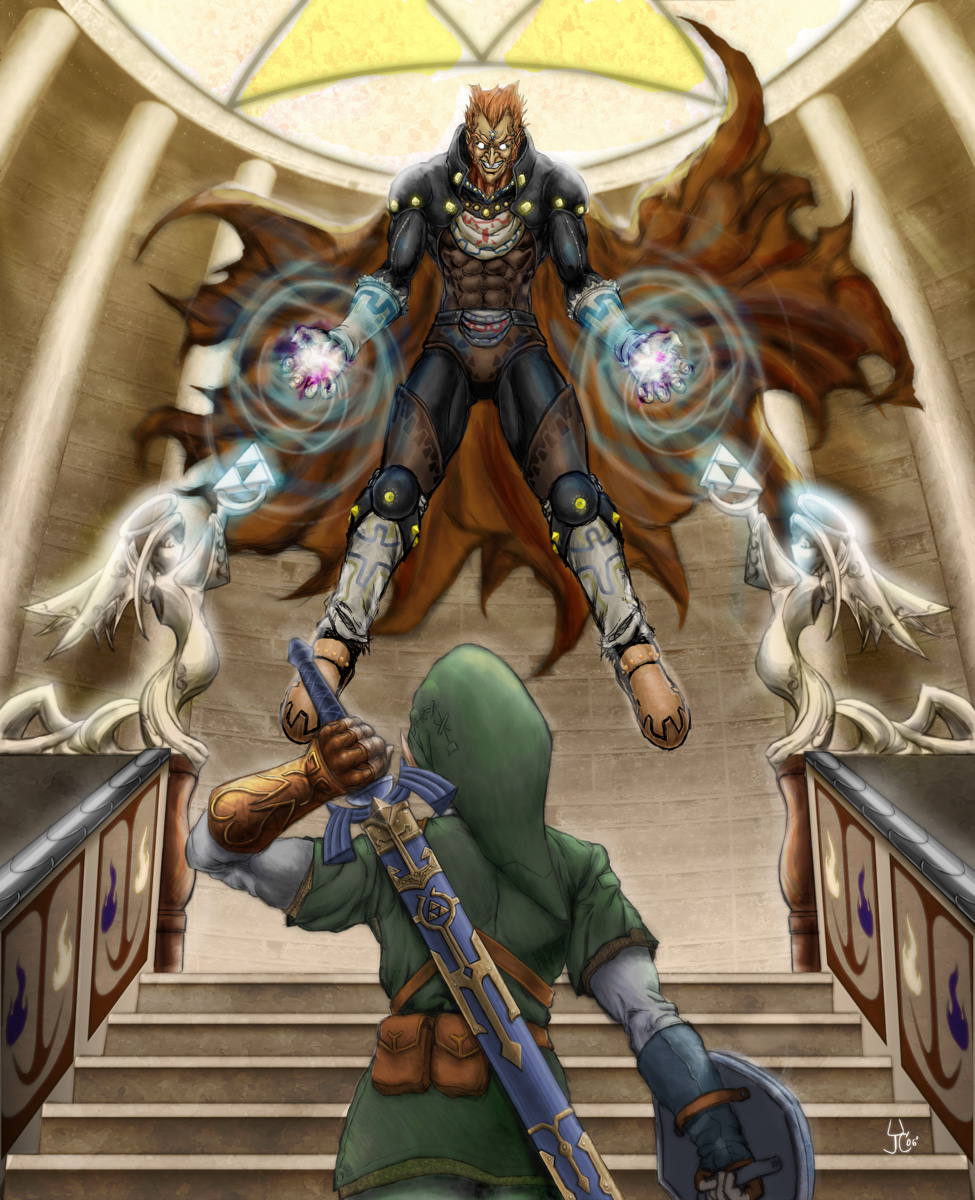This post has not been edited by the GamesBeat staff. Opinions by GamesBeat community writers do not necessarily reflect those of the staff.
We all try to be like our idols; basketball players want to be like Mike, baseball players want to bat like babe, and tennis stars want to be the swiss maestro Federer.
Games are no different. It's very rare that a game comes out of the blue to be successful; more often than not a game will build upon the blockbuster hits of the current generation. First person shooters build upon the 2-weapon swap coined by Halo, auto-jump coined by Ocarina of Time, so on and so forth.
But blind imitation is very dangerous, and I'd like to point out 5 distinct game elements that can break an overzealous game.
5) God of War Quick Time Events

"Action Game" is unquestionably one of the most obscure genres. Sports games involve sports, shooting games involve shooting, adventure games involve exploration, and platforming games involve jumping from platform to platform. Doesn't leave much for an "action" game does it?
But if any game can be credited to a revival of the genre, it's God of War. From satisfying combat to epic bosses, it brought quick times events (QTE) into the forefront of gaming. It allowed exceedingly complex, visceral, and scripted sequences to be acted out while still having the player feel like he/she is contributing to the action. It's no coincidence that the presence of QTE has skyrocketed since the release of this game. Action games such as Dante's Inferno to shooters such as Call of duty now use quick time events to add drama into the game. But is it really a good idea?
The probem with quick-time events is that they are VERY hard to balance. They must be be frequent enough that the player is prepared for them when they happened, but cannot be so frequent that it clogs up other forms of gameplay. This is where games such as Wet and Dead to Rights Retribution fall short because the quick time events are so numerous and lengthy that they begin to clip into the actual action gameplay.
Even critically acclaimed games such as Uncharted: Drake's Fortune sometimes stumble over this because the quick time events are so infrequent that they often caught me off guard.
4) Regenerating Health – Every Shooter Ever

To be fair, I think Halo 2 needs to be credited to for really "popularizing" the regenerating health bar. It's not hard to see why the regenerating health bar caught on so quickly; it completely streamlined gameplay experience. No longer would people have to scramble to find health kits or run away from cover. You were basically "rewarded" with your health back after a big firefight. It seemed like a no-lose advancement in gaming and almost every shooter has followed suit
But they shouldn't.
There is an inherent problem with regenerating health; it is very hard to balance. The games that have done it right such as Halo or Call of Duty have had to build it on an already existing (and successful) framework. Think about it.
You have to make the game difficult but not too difficult. You can't make it too easy for a player to take cover and recover or the game will basically be boring. But you have to find a way to increase difficulty without increasing damage output because having one or two shots turn the screen blood red is just goddamn annoying. Do you create cover? Do you make the enemy AI flank you? Do you just remove cover altogether and just force the player to outgun his opposition?
Look at Mass Effect 2, a game that I consider one of the best (if not the best) games for the 360. As good as the game is, does anyone remember dying a lot in that game?
Does anyone besides me remember taking cover, combining your 3 most powerful biotics, and then landing headshots with your most powerful pistol? And whenever you had to reload or recharge your biotics, you took cover where no one could even touch you? And when you DID up the difficulty, enemies were routinely taking out half your health with a single biotic?
Mass Effect was lucky enough that it had a stellar story, unbelievably deep characters, gorgeous environments, and was just plain out fun to play.
Not many games are that lucky.
3) Gears of War Cover-Based Combat

With everyone and their mother curb stomping Locust, it's easy to forget that the gameplay of Gears of War revolves around an exceedingly simple concept. Cover based shooting is, by all extents and purposes, hiding behind a box until the enemy is stupid enough to pop it's head out. It's slower paced than turtles marching through peanut butter.
Gears of War wasn't the first game to use this mechanic, but was certainly the first one to gain widespread acclaim with both critics and customers alike. Now, it seems that every game is trying to cash in on its success. But blind imitation is dangerous.
Developers seem to be forgetting that Gears of War became famous for a plethora of different reasons. For starters, it's graphics engine is only second to the Crytek engine in detail. The scale of the story is grand, a tale of the human race with their backs to the wall desperately fighting against a hellish menace. The variety of enemies force players to break from cover strategically or sometimes abandon cover completely.
Without those things, Gears of War would be a very boring game. The fact that cover renders you invulnerable for the most part MUST be balanced by increased difficulty or variety, and most games seem to miss the latter part and reduce their gameplay to an annoying game of whack-a-mole . . . with bullets.
I am once again, unfortunately, going to call upon one of my favorite games for an example: Mass Effect 2. Do you remember how many times that enemies would fire off colorful, reality altering biotics that would shrivel in the face of the chest high wall you were crouching behind? For me personally, I liked the difficulty scaling in the first Mass Effect better.
2) Metal Gear Solid Storytelling

The original Metal Gear Solid is arguably the greatest game to ever come out on Sony's original console. Along with balancing stealth and action sequences with a memorable cast of characters, it became known for having some of the longest and most intricately scripted cut-scenes of all time. So it's easy to think that cinematic cut scenes are the way to go.
No it's not.
I mean, I know it's "to each his own", but think about how cheesy and overly epic Metal Gear Solid is sometimes. It's like Days of Our Lives except with guns and espionage. I mean, it ultimately manages to work because Metal Gear Solid is an epic game which balances stealth with unbelievable boss fights.
For example, my friend bought the game about 2 months after it came out. Seeing as I didn't have a PS3, I drove him to the store, picked up some lunch, and we went to his house. From the time the game started to the time he actually engaged his first enemy, i finished my Chipotle Burrito, washed it down with a 24 oz. drink, and had a 10 minute phone convo with my girlfriend. That's a long time.
Only and I repeat ONLY Metal Gear Solid could pull this off. Any other game that attempts to be this cinematic should just steer clear.
1) Zelda Boss Battles

It's common knowledge that Zelda games are iconic, and perhaps nothing is more iconic then their boss battles. I mean, Link's battle with Ganondorf at the end of Ocarina of Time was responsible for popularizing knocking a boss's projectile back at it.
But since the advent of games such as Ninja Gaiden and God of War it has become increasingly clear that while Zelda's bosses are iconic, they are more about spectacle than functionality.
A Zelda boss battle is almost predictable in a way. First, you find a unique tool in the dungeon. THEN you use the tool on the boss's generously displayed weak spot; like the giant red nucleus that says "please hit me". THEN, the boss goes into a mini-coma in which you use the abnormal stun time to whack it a couple times with your sword. These boss battles literally take a couple minutes in the hands of a proficient and you pretty much have to WORK in order to take damage.
Zelda's boss battles pretty much get a free ride though because of Ganondorf star-power combined with Zelda's devoted fans. Therefore these "iconic" but outdated battles can stand the test of time.
Other games, however, won't have the perfect formula and fame Zelda has in order to distract it's players from the fact that the boss battles are like following the instructions on the back of a shampoo bottle:
Lather, Rinse, Repeat
